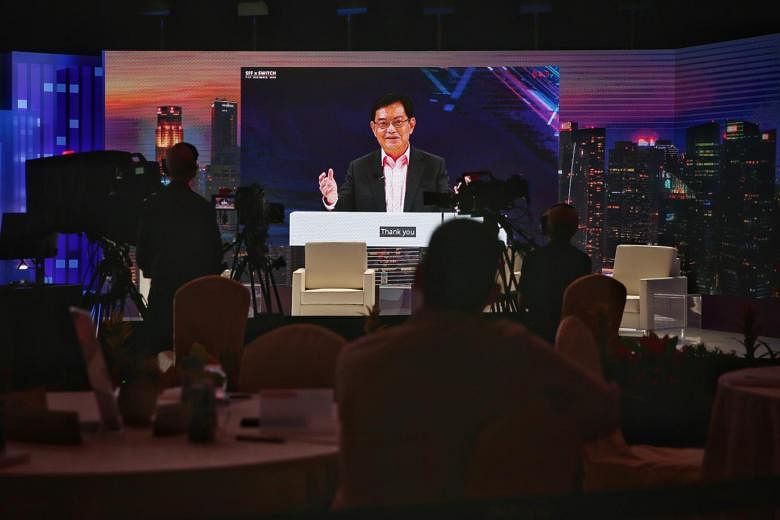SINGAPORE - Over 60,000 participants from 130 countries attended the Singapore FinTech Festival and Singapore Week of Innovation and Technology that ended on Friday (Dec 11).
The five-day hybrid event, Singapore's flagship fintech and innovation convention, featured online sessions by leaders and executives from Singapore and overseas.
Here are five big ideas and solutions that came up during the week.
1. Making insurance claims processing more efficient
Singapore is building a technology platform to enable more efficient health insurance claims processing by securely sharing data, with patients' consent.
The aim is to reduce duplicate claims, manual errors and processing time, said Monetary Authority of Singapore (MAS) managing director Ravi Menon on Tuesday.
"Today, an individual being hospitalised may face uncertainty over his claimable insurance amount. Hospitals have to access multiple systems to request or provide information to different insurers, and some of these processes are still paper-based," he said.
MAS, the Ministry of Health and the Integrated Health Information Systems are working with industry partners to build the platform, which will be piloted next year.
2. Ramping up green finance to meet environmental goals
China, the world's largest carbon dioxide emitter, will improve its green finance standards to speed up its journey towards reducing its carbon footprint.
People's Bank of China (PBOC) governor Yi Gang on Wednesday outlined the central bank's new priorities to raise its standards in green finance, that is, funding of projects with environmental benefits.
China's outstanding green loans topped 11 trillion yuan (S$2.3 trillion) as at June, and its stock of green bonds totalled 1.2 trillion yuan.
Mr Yi said the PBOC will consider introducing mandatory requirements for financial institutions to disclose environment-related information, and enhance capacity to analyse and manage environmental and climate risk.
It will also provide easier access for international investors to China's green finance market, and continue to harness fintech to promote green finance.
The country aims to achieve carbon neutrality, or net-zero emissions, by 2060.
3. Using innovation to widen financial inclusion
Financial inclusion is becoming more important not just in developing countries, but also in developed markets, where small and medium-sized enterprises might not have the same amount of access to credit as large businesses.
This was one of the points raised on Thursday by a panel that included B Capital co-founder and managing partner Eduardo Saverin; Flourish Ventures managing partner Tilman Ehrbeck; and software firm Moxtra's co-founder and chief executive, Mr Subrah Iyar.
Mr Saverin said: "What would be best, everywhere, is for existing institutions to also embrace an agile-first, tech-enabled innovation philosophy, putting customers in the middle of what they do."
This includes digitalisation to lower costs and enable them to lend more broadly, and new ways of assessing credit, he added.
Dr Ehrbeck said: "Ultimately, people need to be better off because of innovations. We don't believe there is a conflict between purpose and profit. If you do right by your customers, be it consumers or small businesses, the economics will take care of themselves."
4. Institutional adoption of cryptocurrency
Dutch bank ING said tests of its digital assets infrastructure Pyctor are well under way, reported cryptocurrency news site CoinDesk.
ING blockchain lead Herve Francois said that Pyctor has conducted two pilots - in secure custody and asset transfer decentralised operations; and token issuance and management operations.
ING is collaborating with other financial institutions such as BNP Paribas Securities Services and Citibank on this technology.
5. Tech firms need to earn users' trust
Trust in technology has to be "earned, not claimed", even as pandemic-induced disruptions may accelerate tech adoption in financial services, said Microsoft chief executive Satya Nadella on Monday.
He told Standard Chartered's group chief executive, Mr Bill Winters, in a fireside chat that Microsoft looks at four core principles to build trust among users: privacy, cyber security, artificial intelligence ethics and Internet safety.
He added that privacy is fast becoming a human right, and companies like Microsoft will need to embed privacy into their engineering process and practice.


